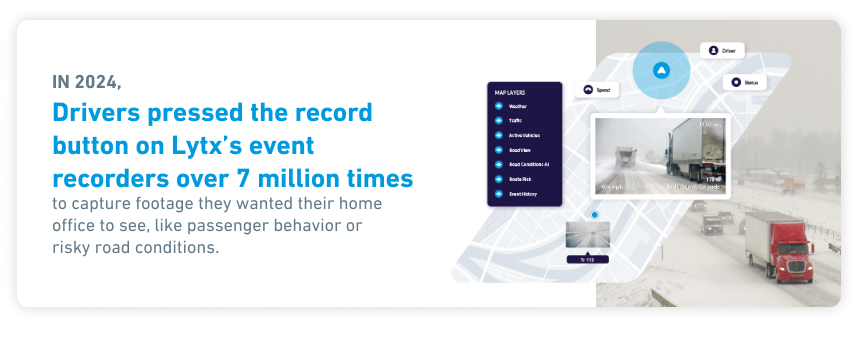Want to Cut Down on Driver Turnover? Build Your Culture Around R-E-S-P-E-C-T

In the fast-paced world of fleet management, it's easy to get caught up in the numbers: miles driven, deliveries made, fuel efficiency, and more. Ask any successful fleet, and they'll tell you their drivers are their greatest asset. Respecting drivers goes beyond mere recognition; it's about creating a culture where they feel valued, supported, and motivated to stay.
Understanding the Importance of Respect
Respect is a fundamental human need, and in the context of fleet management, it translates to acknowledging the hard work and dedication of drivers. It's about more than just saying "thank you". It's about showing drivers that their well-being, opinions, and contributions are genuinely valued. This respect fosters loyalty, reduces turnover, and ultimately leads to a more efficient and harmonious operation.
In fact, according to a 2024 Commercial Carrier Journal (CCJ) survey, drivers responded that after compensation, what they wanted most was respect, recognition, and active communication with in-office teams.
Driver shortages are a costly line item for many fleets. Some estimates say it can cost upwards of $95.5 million weekly, or $47 billion per year.
.png)
Beyond just dollars and cents, driver trust and loyalty go a long way. 75% of drivers believe fleets struggle to recruit and retain because of poor communication and lack of respect by fleet leadership.
Hear from real drivers and coaches on the power that driver respect and recognition can bring to a fleet.
Balancing Recognition, Respect, and Opportunities to Improve
Celebrating a job well done is one critical component of a thriving safety culture. Surfacing risk and finding ways to make real behavior change stick is the other. This balanced approach ensures that drivers feel appreciated and supported while also giving the fleet tools to identify and coach risk in a way that conveys respect and makes a lasting impact.
In fact, this balanced multi-modality approach is proven to work. A recent University of California San Diego study on Evaluating and Optimizing Coaching Methodologies for Fleet Safety and Performance affirmed that a blend of AI-driven detection and human-led intervention was the most effective long-term fleet safety solution. It recommended a blended, scalable approach that includes:
- Brief but regular coaching sessions
- Constructive, balanced feedback supported by structured recognition
- Enhanced progress measurement
- AI integration to scale and personalize coaching
All four elements are part of Lytx®’s safety solutions.
.png)
The study lays out that automated coaching by itself fails to create sustained behavior change.
Relying solely on alerts can lead to “decreased engagement, reduced trust in the system, and, ultimately, compromised learning and safety outcomes” because they can be too generic. And when alerts go off too frequently or have low accuracy, drivers start to ignore them.
And on the flip side, too much positive recognition can backfire.
Positive recognition can significantly boost driver motivation, but “too much positive recognition, however, can negatively impact driver performance, particularly for the riskiest drivers.” That’s because systems that rely solely on praise can unintentionally reinforce risky behaviors by inflating perceived competence.
Lytx’s safety recognition features empower operations and safety teams to celebrate safe driving in real time, directly from video insights. But unlike gamification strategies that can create short-term engagement without sustained change, Lytx reinforces professional behaviors with purpose-driven feedback.
The Role of Technology in Driver Respect
Technology plays a crucial role in respecting drivers. It can not only help identify areas for improvement but also highlight the positive actions drivers take on the road. By leveraging technology, fleets can create a more transparent and supportive environment for drivers.
Jason Cannon, Chief Editor at CCJ, noted that “Drivers are willing to embrace new technology if the protective benefits are explained to them. Show them how this technology will keep them out of an accident or exonerate them in a courtroom, and they will gladly use it.”
.png) Lytx workflows build in driver feedback as part of coaching best practices, and video footage enriches conversations to help drivers and coaches get to the heart of the discussion fast.
Lytx workflows build in driver feedback as part of coaching best practices, and video footage enriches conversations to help drivers and coaches get to the heart of the discussion fast.
Drivers can even manually record what they are experiencing and seeing on the road, giving them more autonomy in the cab. In 2024, drivers pressed the record button on Lytx’s event recorders over 7 million times to capture footage they wanted their home office to see, like passenger behavior or risky road conditions.
.png)
Respect Means More than Just Recognition
Respecting drivers is about more than just recognition. It's about creating a culture where they feel valued, supported, and motivated to stay. At Lytx, we're committed to providing tools and insights that help fleets build this culture. When you invest in your drivers, you invest in the success of your entire operation.
How well is your organization recognizing drivers? Are there opportunities to better fit a blended coaching and recognition approach into your operations?
Hear from a variety of voices on how the right coaching platform can make coaching easier and better for everyone involved.
Interested in learning more? Contact us or book a demo today!
